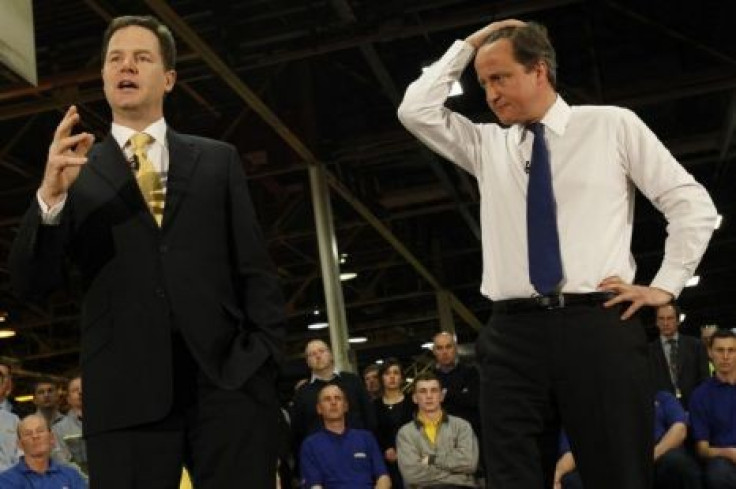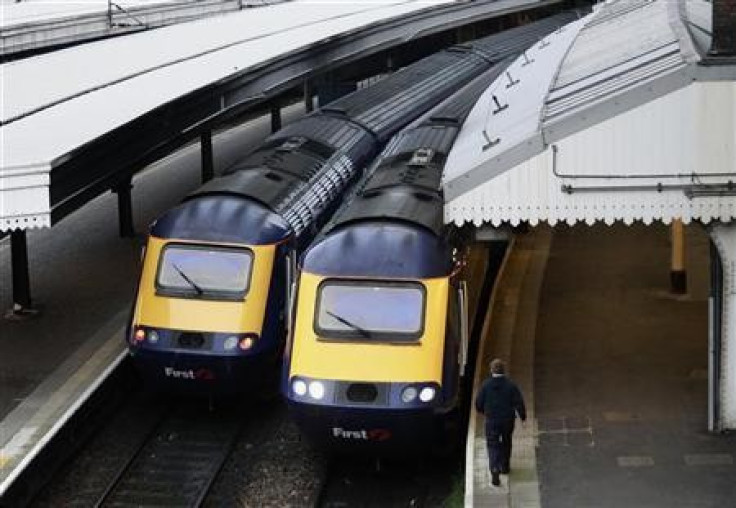David Cameron and Nick Clegg Stress Coalition Unity at £9bn Transport Boost Announcement
Prime minister and Lib Dem leader make joint appearance amid concerns over widening cracks between the two parties.

David Cameron and Nick Clegg used the announcement of £9bn in transport investment as an opportunity to make a public defence of the coalition government.
The Conservative and Lib Dem leaders appeared together ostensibly to announce government plans to boost the country's rail network.
But the speeches revealed more of an attempt to put up a united front and defend the coalition against the impression of widening gaps between the two parties. Commentators have wondered whether the coalition will survive to a 2015 general election.
The pair appeared at a West Midlands rail depot - a location that Cameron admitted was ripe for "on the right track" headlines - to discuss proposed injections of £5bn to boost current Crossrail and Thameslink projects, along with £4.2bn to be spent on new projects.
Cameron said: "This is a government that is aware that we need to get things done and go on to safeguard the British economy in difficult times and whatever we do is in the national interest. That's what this government is all about."
Clegg launched a passionate defence of the coalition, describing it as "strong today as it was in May 2010".
Considering the parties' recent clashes on proposed reforms of the House of Lords and rumours of backbench hostility, Clegg gestured to Cameron, admitting that the two often did not agree.
"It's not always a walk in the park, or in the rose garden, and [there are] some bumps in the road in the Westminster village," he said.
The coalition is still reeling from a 91-Tory MP rebellion on Liberal Democrat-led proposals to reform the House of Lords.
That revolt, which led to Cameron and Clegg withdrawing a timetable vote on the proposals and consigning them to a much more laboured passage through the house, will have lit a fire under Lib Dem backbenchers already frustrated by a coalition that has seen their party making no impact and crippled in the polls.
Clegg said: "House of Lords reform happens to be one of those things that makes politicians really hot under the collar - especially those who don't want change. It always has and it always will, but none of that will stop us from looking to govern in the national interest.
Short-term popularity
"That means accepting that there are no quick and easy short cuts which ensure immediate political popularity. We need to put short-term popularity to one side and get on with looking to make the big long-term reforms and changes that this country desperately needs."
The deputy prime minister then turned his focus to the government's plans for "social renewal", with additional government funding to help young children with systems such as the pupil premium and extended free nursery care.
Rather than a coalition that has "scraped through", Clegg said he wanted people to think of it as having made a difference.
Clegg's highlighting of social renewal seemed like an attempt to emphasis the Liberal Democrat's stamp on some of the coalition's actions. The House of Lords reforms represented the party's best opportunity for a victory since the failed voting referendum.
His comments might not be sufficient to drown out the grumbling from his party, however. Lib Dem home office minister Lynne Featherstone wrote on her blog that "there will be consequences" for the lack of support shown by the Tories to her party's proposals.
Featherstone appeared to hint at threats already made by the party that it would consider vetoing Tory proposals to redraw constituency boundaries, a move that would be expected to net the Conservatives at least 20 seats in the 2015 election.
The two leaders were determined to appear united at thei joint announcement. When they were asked what they believed the odds were on the coalition lasting until 2015, Cameron said he "wouldn't bet against it".
Rail proposals

The government's planned investment in rail infrastructure almost played second fiddle to the morning's political theatrics. Clegg said that Britain was still relying on infrastructure that "has got one foot in the 19th century".
He said that the proposed cash injection and resulting rail improvements, would help to heal the north-south divide, something he considers crucial to country's economic recovery.
New projects will include the completion of electrification of the Midland Main Line between Sheffield and Bedford, along with lines in the Welsh valleys and an extension of electrification between Manchester and Leeds.
The rail industry supports electrification as it will provide trains that are lighter and less vulnerable to breaking down.
The government plans to carry out upgrades to stations and tracks around cities to allow an extra 140,000 daily rail commutes at peak time. This will include £350m to lengthen platforms at London Waterloo.
The East Coast Mainline is expected to be upgraded at a cost of £240m between London and Newcastle and Leeds.
Improvements will be made to the "Northern Hub" with a series of upgrades around Manchester.
The east-west link from Oxford and Aylesbury to Milton Keynes will also be reopened. Key ports such as Southampton are expected to be subject to improved rail freight links.
A new rail link between the Great Western rail line and Heathrow airport, at a cost of £500m, is also mooted.
Taxpayer funding
As far as funding for the projects go, a healthy proportion is expected to come from the taxpayer, while concerns have been raised that it will lead to yet another increase in rail fares. Building work is not expected to begin until 2014 at the earliest.
Cabinet members showed their support for the proposal. Chancellor George Osborne said: "I am pleased that the Northern hub will be funded in full as part of the government's plans, which is a significant boost for the major towns and cities of the north, helping to rebalance the UK economy and enabling growth and regeneration throughout the regions.
"This government is making more fund available to invest in rail projects than at any time since the Victorian era."
Rachel Reeves, Labour's shadow chief secretary to the Treasury, said: "I hope all these little things add up to something material, but it doesn't seem like the comprehensive plan for jobs and growth that the country needs."
RMT general secretary Bob Crow said: "What we need is investment in rail today, not yet another political promise of jam tomorrow. All the rail projects on this shopping list have been talked about for years and, with the surge in passenger demand, we cannot afford further delays like the ongoing Thameslink fleet replacement fiasco.
"We have the chance to create thousands of rail jobs if the politicians wake up and get these projects moving."
© Copyright IBTimes 2024. All rights reserved.





